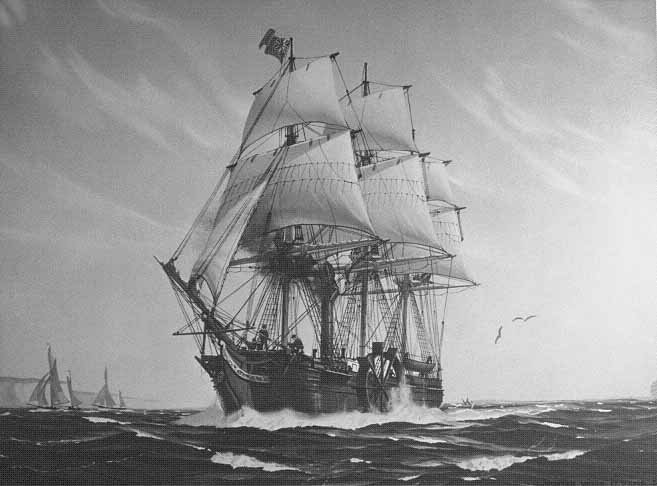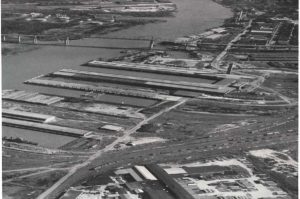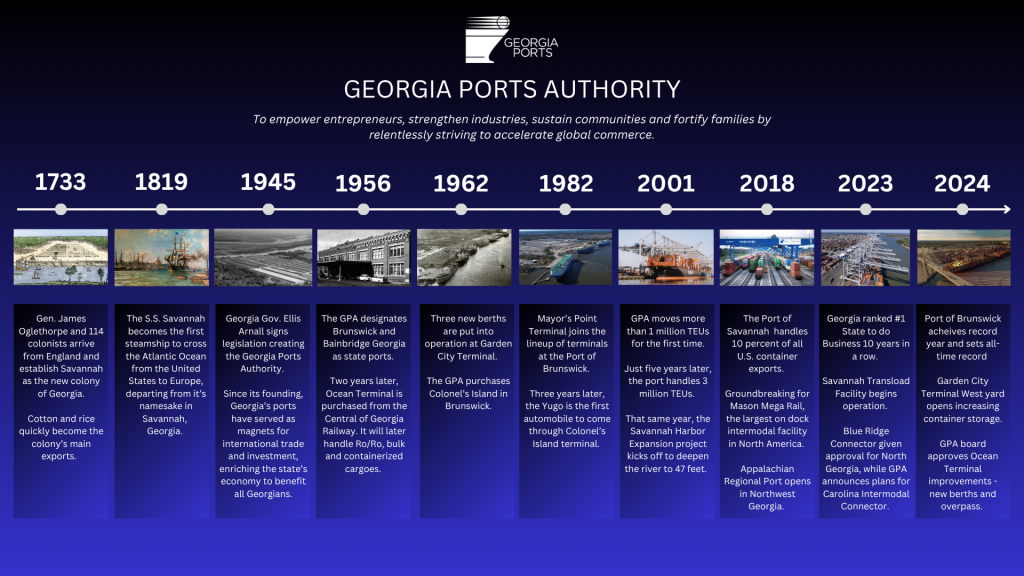Our History - 80 Years Strong
Accelerating global commerce
The Georgia Ports Authority – with control over the deepwater ports in both Savannah and Brunswick – was created by an act of the Georgia legislature in response to the post-World War II economic boom. The new authority was empowered to operate state-owned facilities and “to do any other things necessary to proper to foster or encourage the commerce, domestic or foreign, of the state, the United State of America, or the several sister states.” The order was signed by Governor Ellis Arnall on March 9, 1945.
The Georgia Ports Authority (GPA) is celebrating 80 years of advancing global trade and economic prosperity. Since its establishment in 1945, GPA has become a cornerstone of Georgia’s economy, growing into one of the largest and most efficient port authorities in the United States.
Today, the Georgia Ports Authority continues its historic role as the epicenter of Georgia’s and the Southeast’s economy. Interstate highways have joined railroads as the vital arteries of international trade that connect Georgia’s ports with America’s trading partners across the globe.
“GPA has played a pivotal role in positioning Georgia as a vital hub for international commerce, facilitating billions in trade and creating thousands of jobs statewide,” said GPA President and CEO Griff Lynch.
With $4.5 billion in planned investments over the next decade, the Georgia Ports Authority is making strategic investments now to ensure the continued growth of a major economic engine for the Southeast region.
Some key dates in Georgia Ports history include:
- 1733 – Gen. James Edward Oglethorpe and 114 colonists land on what is then known as Yamacraw Bluff on the Savannah River and establish Savannah and the new colony of Georgia. Cotton and rice quickly become the new colony’s money crops and Savannah becomes one of the leading cotton-shipping ports in the world.
- 1793 – At Mulberry Grove Plantation on a bluff above the Savannah River, a young teacher named Eli Whitney invents the cotton gin, forever transforming the agricultural landscape of the South.
- 1819 – The S.S. Savannah, the first steamship to cross the Atlantic Ocean from the United States to Europe, sails from Savannah in May, arriving in Liverpool, England 29 days later.

The first steamship to cross the Atlantic Ocean, the SS Savannah sailed from Savannah Harbor in May 1819. - 1945 – The Georgia Ports Authority – with control over the deepwater ports in both Savannah and Brunswick – is created by an act of the Georgia legislature in response to the post-World War II economic boom.
- 1948 – The GPA acquires land on the Savannah River in Garden City, creating Garden City Terminal to handle bulk and general cargoes and, later, containerized cargo.
- 1956 – Gov. Marvin Griffin signs a bill to make Brunswick and Bainbridge state ports.
- 1958 – Ocean Terminal is purchased from the Central of Georgia Railway. It will later become a roll-on, roll-off terminal, handling primarily automobiles and wheeled heavy equipment.
- 1960 – State docks at Brunswick dedicated.
- 1962 – Gov. Ernest Vandiver dedicates the improvements at Ocean Terminal. Three new berths put into operation at the Garden City Terminal. GPA purchased Colonel’s Island in Brunswick for $1.1 million.
- 1969 – Container Berth 1 construction begins at Garden City Terminal.
- 1972 – The first container terminal opens; container service with Japan begins; a second container terminal is planned.
- 1985 – The GPA purchases the 2,200 acre Drakie Plantation.
- 1992 – Harbor widened at Port of Savannah to 500 feet.
- 1995 – Port of Savannah chosen as primary port of entry for the 1996 centennial Olympic games.
- 2001 – The first year GPA moved more than 1 million TEUs.
- 2003 – Savannah’s port is ranked the fourth busiest in the country.

A look at the Port of Savannah’s Ocean Terminal in 1962. - 2008 – GPA adds first reefer racks as poultry and other refrigerated cargo increases. The racks are more efficient and safer than traditional single plugs for refrigerated containers.
- April 11, 2012 – After 15 years of study, the United States Army Corps of Engineers (USACE) released the final documents for the Savannah Harbor Expansion Project (SHEP).
- June 30, 2014 – FY2014 was the first fiscal year in which the Port of Savannah handled more than 3 million TEUs.
- July 13, 2016 – The MOL Benefactor is the first vessel to call on Savannah through the new locks of the expanded Panama Canal. At a capacity of 10,100 twenty-foot equivalent container units, the Benefactor is also the largest ship ever to call the Port of Savannah.
- 2017 – First 13,000 TEU vessel, COSCO Development, calls the Port of Savannah.
- 2017 – An economic impact study conducted by UGA’s Terry College of Business and the Survey Research Center at Savannah State University concludes Georgia’s deepwater ports and inland barge terminals support more than 439,000 jobs throughout the state annually and contribute $25 billion in income, $106 billion in revenue and $2.9 billion in state and local taxes to Georgia’s economy. The Port of Savannah handled 8.5 percent of U.S. containerized cargo volume and 10 percent of all U.S. containerized exports in FY2017.
- September 2018 – First 14,000 TEU vessel, CMA CGM Theodore Roosevelt, calls the Port of Savannah.
- August 2018 – Grand opening of the Appalachian Regional Port in Murray County.
- 2018 – The Port of Savannah handles 10 percent of all U.S. container exports.
- 2018 – Groundbreaking for Mason Mega Rail, the largest on dock intermodal facility in North America.
- 2019 – The Port of Savannah moves a record 4.5 million twenty-foot equivalent container units in Fiscal Year 2019.
- 2023 – Georgia ranked #1 State to do Business 10 years in a row.
- 2023 – Savannah Transload Facility begins operation.
- 2023 – Blue Ridge Connector given approval for North Georgia, while GPA announces plans for Carolina Intermodal Connector.
- 2024 – Port of Brunswick achieves record year and sets all-time record or Ro/Ro units in one month.
- 2024 – Garden City Terminal West yard opens increasing container storage.
- 2024 – GPA board approves Ocean Terminal improvements including new berths and overpass
- 2025 – GPA purchases and erects eight new ship-to-shore cranes, the largest cranes on the U.S. East Coast, expanding Savannah’s big ship capability.
- 2025 – The Georgia Ports Authority moves 5.7 million twenty-foot equivalent container units in fiscal year 2025, an increase of 8.6 percent or 450,000 TEUs compared to the previous fiscal year – the second busiest year on record for The Port of Savannah.
